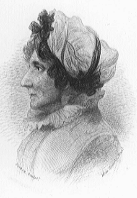Anna Letitia Barbauld
English author (1743–1825)
Anna Letitia Barbauld (June 20, 1743 – March 9, 1825) was an English poet and miscellaneous writer.

Quotes
edit- Child of mortality, whence comest thou? Why is thy countenance sad, and why are thine eyes red with weeping?
- Hymns in Prose for Children (London: J. Johnson, 1794), Hymn 10, p. 83.
Poems (1773)
edit- Poems (London: Joseph Johnson, 1773)
- Man is the nobler growth our realms supply,
And souls are ripen'd in our northern sky.- "The Invitation", p. 22.
- O gently guide my pilgrim feet
To find thy hermit cell;
Where in some pure and equal sky
Beneath thy soft indulgent eye
The modest virtues dwell.- "Hymn to Content", p. 54.
- It is to hope, tho' hope were lost.
- "Song I", p. 68
- Compare: "Who against hope believed in hope", Romans iv, 18; "Hope against hope, and ask till ye receive", James Montgomery, The World before the Flood.
- Flowers, the sole luxury which nature knew,
In Eden's pure and guiltless garden grew.[…]
Gay without toil, and lovely without art,
They spring to cheer the sense, and glad the heart.- "To a Lady, with some painted Flowers", pp. 96.
- I read his awful name, emblazon'd high
With golden letters on th' illumin'd sky.- "An Address to the Deity", p. 128.
- With Thee in shady solitudes I walk,
With Thee in busy, crowded cities talk,
In every creature own Thy forming power,
In each event Thy providence adore.- "An Address to the Deity", p. 129.
- This dead of midnight is the noon of thought,
And Wisdom mounts her zenith with the stars.- "A Summer's Evening Meditation", p. 134.
"The Mouse's Petition" (1773)
edit- Dedicated to Joseph Priestley - Full text at Wikisource
- Oh! hear a pensive captive's prayer,
For liberty that sighs;
And never let thine heart be shut
Against the prisoner's cries.
- If e'er thy breast with freedom glow'd,
And spurn'd a tyrant's chain,
Let not thy strong oppressive force
A free-born mouse detain.
- The cheerful light, the vital air,
Are blessings widely given;
Let nature's commoners enjoy
The common gifts of heaven.The well-taught philosophic mind
To all compassion gives;
Casts round the world an equal eye,
And feels for all that lives.If mind, as ancient sages taught,
A never dying flame,
Still shifts thro' matter's varying forms,
In every form the same,Beware, lest in the worm you crush
A brother's soul you find;
And tremble lest thy luckless hand
Dislodge a kindred mind.
- So when destruction lurks unseen,
Which men like mice may share,
May some kind angel clear thy path,
And break the hidden snare.
The Works of Anna Laetitia Barbauld (1825)
edit- The Works of Anna Laetitia Barbauld, ed. Lucy Aikin (London: Longman, Hurst, Rees, Orme, Brown, and Green, 1825)
- Life! we've been long together,
Through pleasant and through cloudy weather;
'Tis hard to part when friends are dear,;br>Perhaps 'twill cost a sigh, a tear;
Then steal away, give little warning,
Choose thine own time;
Say not Good night, but in some brighter clime
Bid me Good morning.- "Life", Vol. I, p. 261.
- So fades a summer cloud away;
So sinks the gale when storms are o’er;
So gently shuts the eye of day;
So dies a wave along the shore.- "The Death of the Virtuous", Vol I, p. 315.
- Compare: "The daisie, or els the eye of the day", Geoffrey Chaucer, Prologue of the Legend of Good Women, line 183.
- It would be difficult to determine whether the age is growing better or worse; for I think our plays are growing like sermons, and our sermons like plays.
- Letter to Miss E. Belsham (Feb. 1771), Vol. II, p. 59.
- If an author would have us feel a strong degree of compassion, his characters must not be too perfect.
- "An Inquiry into Those Kinds of Distress Which Excite Agreeable Sensations", Vol. II, p. 224.
- We may think all religions beneficial, and believe of one alone that it is true.
- "Thoughts on the Devotional Taste, and on Sects and Establishments", Vol. II, p. 259.
- It is, in truth, the most absurd of all suppositions, that a human being can be educated, or even nourished and brought up, without imbibing numberless prejudices from every thing which passes around him.
- "On Prejudice", Vol. II, p. 326.
- Let us confess a truth, humiliating perhaps to human pride;—a very small part only of the opinions of the coolest philosopher are the result of fair reasoning; the rest are formed by his education, his temperament, by the age in which he lives, by trains of thought directed to a particular track through some accidental association—in short, by prejudice.
- "On Prejudice", Vol. II, pp. 326–327.
External links
edit- Works by Anna Laetitia Barbauld at Project Gutenberg
- Several of Barbauld's writings are available from the Women Writers Project.
- Prose Works of Anna Barbauld
- Selected works of Anna Barbauld including a full-color facsimile of The Works of Anna Lætitia Barbauld (1825)
- Selections from the Spectator, Tatler, Guardian and Freeholder at google books
- The Female Speaker at google books
| This article on an author is a stub. You can help out with Wikiquote by expanding it! |